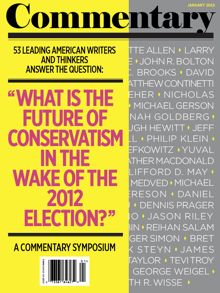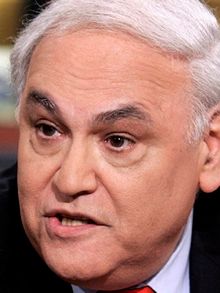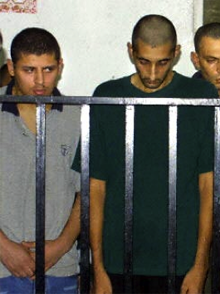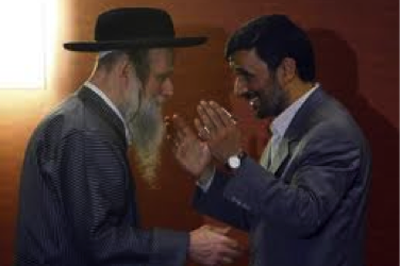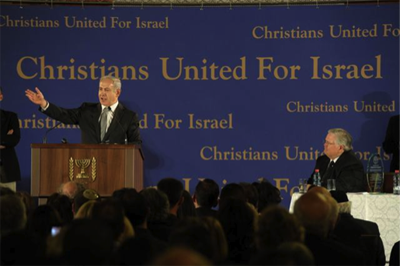“The machiavelian threefold game of the neoconservatives”
by Laurent Guyénot, Voltairenet.org
Who are the neoconservatives?
The neoconservative movement, which is generally perceived as a radical (rather than “conservative”) Republican right, is, in reality, an intellectual movement born in the late 1960s in the pages of the monthly magazine Commentary, a media arm of the American Jewish Committee, which had replaced the Contemporary Jewish Record in 1945. The Forward, the oldest American Jewish weekly, wrote in a January 6th, 2006 article signed Gal Beckerman: “If there is an intellectual movement in America to whose invention Jews can lay sole claim, neoconservatism is it. It’s a thought one imagines most American Jews, overwhelmingly liberal, will find horrifying. And yet it is a fact that as a political philosophy, neoconservatism was born among the children of Jewish immigrants and is now largely the intellectual domain of those immigrants’ grandchildren”. The neoconservative apologist Murray Friedman explains that Jewish dominance within his movement by the inherent benevolence of Judaism, “the idea that Jews have been put on earth to make it a better, perhaps even a holy, place” (The Neoconservative Revolution: Jewish Intellectuals and the Shaping of Public Policy, 2006).
Just as we speak of the “Christian Right” as a political force in the United States, we could also therefore speak of the neoconservatives as representing the “Jewish Right”. However, this characterization is problematic for three reasons. First, the neoconservatives are a relatively small group, although they have acquired considerable authority on and within Jewish representative organizations, including the Conference of Presidents of Major American Jewish Organizations. In 2003, journalist Thomas Friedman of the New York Times counted twenty-five members saying, “if you had exiled them to a desert island a year and half ago, the Iraq war would not have happened”. The neoconservatives compensate for their small number by multiplying their Committees, Projects, and other think tanks, which certainly give them a kind of ubiquity.
Second, the neoconservatives of the first generation mostly came from the left, even the extreme Trotskyist left for some such as Irving Kristol, one of the main editors of Commentary. During the late 1960s the Commentary editorial staff begins to break with the liberal, pacifist left, which they suddenly find decadent. Norman Podhoretz, editor of Commentary from 1960 until his retirement in 1995, was a militant anti-Vietnam dissenter until 1967, but then in the 70s became a fervent advocate of an increased defense budget (sic), bringing the journal along in his wake. In the 1980s, he opposed the policy of détente in his book The Present Danger: in the 1990s, he calls for the invasion of Iraq, and then again in the early 2000s. In 2007, while his son John Podhoretz was taking over as editor of Commentary, he asserted once again the urgency of a U.S. military attack, this time against Iran.
Third, unlike evangelical Christians who openly proclaim their unifying religious principles, neoconservatives do not display their Judaism. Whether they’d been Marxists or not, they appear mostly non-religious. It is well-know that their major influence is the philosophy of Leo Strauss, so much so that they are sometimes referred to as “the straussians”; Norman Podhoretz and his son John, Irving Kristol and his son William, Donald Kagan and his son Robert, Paul Wolfowitz, Adam Shulsky, to name just a few, all expressed their debt to Strauss. Leo Strauss, born to a family of German Orthodox Jews, was both pupil and collaborator of political theorist Carl Schmitt, himself a specialist of Thomas Hobbes and advocate of a “political theology” by which the State must appropriate the attributes of God. Schmitt was an admirer of Mussolini, and the legal counsel of the Third Reich. After the Reichstag fire in February 1933, it was Schmitt who provided the legal framework that justified the suspension of citizen rights and the establishment of the dictatorship. It was also Schmitt, in 1934, who personally obtained from the Rockefeller Foundation a grant for Leo Strauss to study Thomas Hobbes in London and Paris, and then finally end up teaching in Chicago.
The thinking of Leo Strauss is difficult to capture, and certainly beyond the purview of this work. Moreover, Strauss is often elliptic because he believes that Truth is harmful to the common man and the social order and should be reserved for superior minds. For this reason, Strauss rarely speaks in his own name, but rather expressed himself as a commentator on classical authors, in whom he discovers many of his own thoughts. Moreover, much like his disciples Allan Bloom (The Closing of the American Mind, 1988) and Samuel Huntington, he is careful to clothe his most radical ideas in ostensibly humanist principles. Despite the apparent difficulty, three basic ideas can easily be extracted from his political philosophy, no different from Schmitt. First, nations derive their strength from their myths, which are necessary for government and governance. Second, national myths have no necessary relationship with historical reality: they are socio-cultural constructions that the State has a duty to disseminate. Third, to be effective, any national myth must be based on a clear distinction between good and evil; it derives its cohesive strength from the hatred of an enemy nation. As recognized by Abram Shulsky and Gary Schmitt in an article “Leo Strauss and the World of Intelligence” (1999), for Strauss, “deception is the norm in political life” – the rule they applied to fabricating the lie of weapons of mass destruction by Saddam Hussein when working inside the Office of Special Plans.
"Neoconservatism is essentially a modern Jewish version of Machiavelli’s political strategy. What characterizes the neoconservative movement is therefore not as much Judaism as a religious tradition, but rather Judaism as a political project, i.e. Zionism, by Machiavellian means..."
[dropcap]I[/dropcap]n his maturity, Strauss was a great admirer of Machiavelli, who he believes he understood better than anyone. In his Thoughts on Machiavelli, he parts from the intellectual trend of trying to rehabilitate the author of The Prince against the popular opinion regarding his work as immoral. Strauss recognizes the absolute immorality of Machiavelli, which he sees as the source of his revolutionary genius, “We are in sympathy with the simple opinion about Machiavelli, not only because it is wholesome, but above all because a failure to take that opinion seriously prevents one from doing justice to what is truly admirable in Machiavelli; the intrepidity of his thought, the grandeur of his vision, and the graceful subtlety of his speech”. The thought of Machiavelli is so radical and pure, says Strauss, that its ultimate implications could not be spelled out: “Machiavelli does not go to the end of the road; the last part of the road must be travelled by the reader who understands what is omitted by the writer”. Strauss is the guide who can help his neoconservative students do that, for “to discover from [Strauss’] writings what he regarded as the truth is hard; it is not impossible”. This truth that Machiavelli and Strauss share is not a blinding light, but rather a black hole that only the philosopher can contemplate without turning into a beast: there is no afterlife, and neither good nor evil; therefore the ruling elite shaping the destiny of their nation need not worry about the salvation of their own souls. Hence Machiavelli, according to Strauss, is the perfect patriot.
- Breaking away from the classical political theory which sought to make virtue the condition of power, Machiavelli (1469-1527) asserted that only the appearance of virtue counts, and that the successful prince must be a “great simulator” who manipulates and cons people’s mind”. The ruler he most admired was Cesar Borgia, who after having appointed the cruel Ramiro d’Orco to subdue the province of Romania, had him executed with extreme cruelty, thus diverting the hatred of the people on another and reaping his gratitude.
Neoconservatism is essentially a modern Jewish version of Machiavelli’s political strategy. What characterizes the neoconservative movement is therefore not as much Judaism as a religious tradition, but rather Judaism as a political project, i.e. Zionism, by Machiavellian means. Note that, in an article in the Jewish World Review on June 7th, 1999, the neoconservative Michael Ledeen defends the thesis that Machiavelli was a crypto-Jew, as were at the time thousands of families nominally converted to Catholicism under threat of expulsion or death. “Listen to his political philosophy, and you will hear the Jewish music”, wrote Ledeen, citing in particular Machiavelli’s contempt for the nonviolent ethics of Jesus and his admiration for the pragmatism of Moses, who was able to kill countless men in the interests of enforcing his new law.

Durable Neocon: Elliott Abrams, Senior Fellow for Middle Eastern Studies, Council on Foreign Relations , testifies on Capitol Hill in Washington, Wednesday, Feb. 9, 2011, before the House Foreign Affairs Committee. Abrams was a prominent weaver and promoter of evil policies under Reagan.
Obviously, if Zionism is synonymous with patriotism in Israel, it cannot be an acceptable label in American politics, where it would mean loyalty to a foreign power. This is why the neoconservatives do not represent themselves as Zionists on the American scene. Yet they do not hide it altogether either. Elliott Abrams, Deputy National Security Adviser in the administration of Bush’s son, wrote in his book Faith or Fear (1997): “Outside the land of Israel, there can be no doubt that Jews, faithful to the covenant between God and Abraham, are to stand apart from the nation in which they live. It is the very nature of being Jewish to be apart — except in Israel — from the rest of the population”. It is hard to come with a better definition of Zionism, the corollary of which is the apartheid practiced against non-Jewish peoples in Palestine, defended in the same year by Douglas Feith in his “Reflections on Liberalism, Democracy and Zionism”, pronounced in Jerusalem, defending the right of Israel to be an “ethnic nation”: “there is a place in the world for non-ethnic nations and there is a place for ethnic nations”.
If one is entitled to consider the neoconservatives as Zionists, it is especially in noting that their foreign policy choices have always coincided perfectly with the interests of Israel (as they see it). Israel’s interest has always been understood as dependent on two things: the immigration of Eastern Jews and the financial support of the Jews of the West (American and, to a lesser extent, European). Until 1967, the national interest pushed Israel toward the Soviet Union, while the support of American Jews remained quiet. The socialist and collectivist orientation of the Labor Party in power naturally inclined them in this direction, but Israel’s good relations with the USSR were primarily due to the fact that the mass immigration of Jews was only possible through the good will of the Kremlin. During the three years following the end of the British mandate on Palestine (1948), which had hitherto limited Jewish immigration out of consideration for the Arab population, two hundred thousand Polish Jewish refugees in the USSR were allowed to settle in Palestine, with others coming from Romania, Hungary and Bulgaria.
The Six Day War was a decisive turning point: in 1967, Moscow protested against Israel’s annexation of new territories, broke diplomatic relations with Tel Aviv and stopped the emigration of its Jewish citizens, which had accelerated in the previous month. It is from this date that Commentary became, in the words of Benjamin Balint, “the contentious magazine that transformed the Jewish left into the neoconservative right”. The neoconservatives realized that, from that point, Israel’s survival – and its territorial expansion – depended on the support and protection of another super-power, the U.S. military, and concomitantly that their need for Jewish immigrants could only be fulfilled by the fall of communism. These two objectives converged in the deepening of military power of the United States. This is why Irving Kristol engaged the American Jewish Congress in 1973 to fight George McGovern’s proposal to reduce the military budget by 30%: “this is to drive a knife into the heart of Israel. [...] Jews don’t like a big military budget, but it is now an interest of the Jews to have a large and powerful military establishment in the United States. [...] American Jews who care about the survival of the state of Israel have to say, no, we don’t want to cut the military budget, it is important to keep that military budget big, so that we can defend Israel”. We now understand better what reality Kristol was referring to, when he famously defined a neoconservative as “a liberal who has been mugged by reality”.
In the late 60s, the neoconservatives support the militarist fringe of the Democratic Party, headed by Senator Henry Scoop Jackson, a supporter of the Vietnam War who challenged McGovern in the 1972 primaries. Richard Perle, parliamentary assistant to Jackson, wrote the Jackson-Vanik amendment, which made food aid to the Soviet Union conditional upon the free emigration of Jews. It is also within the office of Scoop Jackson that an alliance between the neoconservatives and the Rumsfeld-Cheney tandem will be forged, before Rumsfeld and Cheney took advantage of the Watergate scandal to join the Republican camp and infiltrate the White House. Perle placed his protégés Paul Wolfowitz and Richard Pipes in Team B, whose report was published in Commentary. During the Carter period, neoconservatives allied with evangelical Christians, viscerally anti-communist and generally well disposed towards Israel, the foundation of which they see as a divine miracle foreshadowing the return of Christ. The contribution of the neoconservatives to the Reagan victory allowed them to work within the government to strengthen the alliance between the United States and Israel; in 1981, the two countries signed their first military pact, then embarked on several shared operations, some legal and others not so, as evidenced by the network of arms trafficking and paramilitary operations embedded within the Iran-Contra affair. Anti-communism and Zionism had become so linked in their common cause, that in 1982, in his book The Real Anti-Semitism in America, the director of the Anti-Defamation League Nathan Perlmutter could turn the pacifism of the “peacemakers of Vietnam vintage, [the] transmuters of swords into plowshares”, into a new form of anti-Semitism.
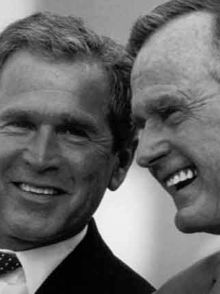
- Andrew Cockburn reports in his book on Rumsfeld (2007) this conversation between the two George Bushes : “What’s a neocon?” asks W. “Do you want names, or a description?”, says Poppy. “Description” “Well, I’ll give it to you in one word: Israel.”
With the end of the Cold War, the national interest of Israel changed once again. Their primary objective became not the fall of communism, but rather the weakening of Israel’s enemies. Thus the neoconservatives underwent their second conversion, from anti-communism to islamophobia, and created new think tanks such as the Washington Institute for Near East Policy (WINEP) led by Richard Perle, the Middle East Forum led by Daniel Pipes (son of Richard), the Center for Security Policy (CSP) founded by Frank Gaffney, and the Middle East Media Research Institute (MEMRI). President George H.W. Bush, however, cultivated friendships with Saudi Arabia and was not exactly a friend of Israel; he resisted in September of 1991 against an unprecedented pro-Israel lobbying campaign that called for $10 billion to help Jews immigrate from the former Soviet Union to Israel. He complained in a televised press conference on September 12th that “one thousand Jewish lobbyists are on Capitol Hill against little old me”, thereby causing Tom Dine, the Executive Director of AIPAC, to exclaim that “September 12, 1991, is a day that will live in infamy”. Bush also resisted the neoconservatives’ advice to invade Iraq after Operation Desert Storm. Finally, Bush’s Secretary of State James Baker was too receptive to Arab proposals throughout the Madrid Conference in November 1991; the neoconservatives, as a result, sabotaged Bush’s chances for a second term and supported Democrat Bill Clinton. After eight years of Clinton, they finally completed their victory by having Bush’s son George W. elected and forcing him into the second Iraq war.
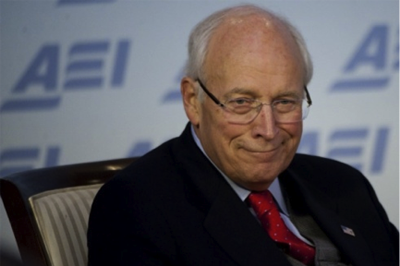
- The American Enterprise Institute for Public Policy Research (AEI), founded in 1943 by businessmen opposed to the New Deal, was overtaken by the neocons in the 70s, who tripled its budget. Some weeks before launching the war against Iraq, President George W. Bush congratulated them : “At the American Enterprise Institute some of the finest minds in our nation are at work in some of the greatest challenges to our nation. You do such good work that my administration has borrowed twenty such minds”.
During Clinton’s two terms, while the Madrid agreements were buried by the Oslo Accords negotiated directly with an overwhelmed Yasser Arafat, neoconservatives prepared their return with Rumsfeld and Cheney, and threw all their weight behind their ultimate think tank, the Project for the New American Century (PNAC). William Kristol, son of Irving, also founded in 1995 a new magazine, The Weekly Standard, that immediately became the dominant voice of the neoconservatives thanks to funding from the pro-Israeli Rupert Murdoch. In 1997, it would be the first publication to call for a new war against Saddam Hussein. During the Clinton years, neoconservatives, although consulted by the White House, were not part of it. And so it is relevant to mention that, during this same time, the FBI was investigating an Israeli mole in the White House, who was allegedly using the code name “Mega” and enjoying privileged access to the Security Council. According to the investigator Gordon Thomas, quoted by the New York Post on March 5th1998, the FBI investigation was stopped when “Israel blackmailed President Clinton with private recordings of his steamy conversations with Monica Lewinsky”.
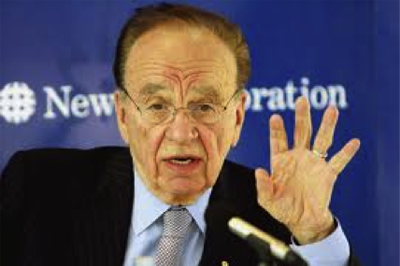
- To spread their war agenda, neoconservatives could rely of Rupert Murdoch’s powerful News Corporation, which owned 175 written publications selling more than 40 millions newspapers each week, and 35 TV channels reaching 110 million viewers on four continents. En 2003, all of them were in favor of the war against Iraq. Murdoch is a friend of Ariel Sharon and a loyal supporter of the Likud party. He is also close to Tony Blair, who is the godfather of one of his children.
Speeches and mirrors
The 2007 book by John Mearsheimer and Stephen Walt, The Israel Lobby and U.S. Foreign Policy, shocked the American public by exposing the considerable influence of pro-Israel groups, the oldest of which being the Zionist Organization of America, and the most influential since the 70s, the American Israel Public Affairs Committee (AIPAC). The authors demonstrate that “the Lobby” has been the major force driving the United States into the Iraq war and, more generally, into a foreign policy that lacks coherence and morality in the Middle East. The authors’ thesis is yet incomplete because they leave absent the complementary role played from within State by the neoconservatives, who form the other arm of the pliers now holding the American foreign policy.
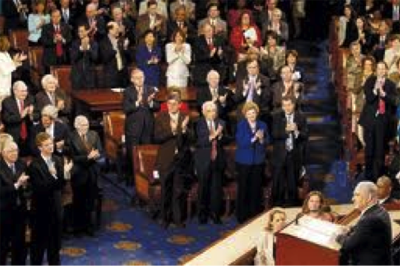
- “We, the Jewish people control America, and the Americans know it”, Prime Minister Ariel Sharon said to minister of Foreign Affairs Shimon Peres on October 3, 2001, according to Israeli radio Kol Yisrael. His successor Benjamin Netanyahu proved it on May 24, 2011 by receiving 29 standing ovation by the American Congress, including at each of those sentences: “in Judea and Samaria, the Jewish people are not foreign occupiers” ; “No distortion of history could deny the 4,000-year-old bond between the Jewish people and the Jewish land” ; “Israel will not return to the indefensible boundaries of 1967” ; “Jerusalem must never again be divided. Jerusalem must remain the united capital of Israel ».
These two forces — the crypto-Zionists infiltrated in the government and the pro-Israel lobby — sometimes act in criminal conspiracy, as illustrated by the charge against Larry Franklin in 2005, who, as a member of the Office of Special Plans working under Douglas Feith, passed classified defense documents to two AIPAC officials, Steven Rosen and Keith Weissman, who in turn transmitted them to a senior officials in Israel. Franklin was sentenced to thirteen years in prison (later reduced to ten years of house-arrest), while Rosen and Weissman were acquitted. Most neoconservatives are active members of the second most powerful lobby pro-Israel, the Jewish Institute for National Security Affairs (JINSA), of which Dick Cheney and Ahmed Chalibi are also members, among others responsible for instigating the Iraq invasion. JINSA was founded in 1976 by American army officers, intellectuals, and politicians, with one of its stated aims “to inform the American defense and foreign affairs community about the important role Israel can and does play in bolstering democratic interests in the Mediterranean and the Middle East”. Colin Powell, according to his biographer Karen DeYoung, privately railed against this “separate little government” composed of “Wolfowitz, Libby, Feith, and Feith’s ‘Gestapo Office’”, which he also called “the JINSA crowd”.
In 2011, Powell’s former Chief of Staff Lawrence Wilkerson openly denounced the duplicity of neoconservatives such as David Wurmser and Douglas Feith, whom he considered like “card-carrying members of the Likud party. […] I often wondered if their primary allegiance was to their own country or to Israel. That was the thing that troubled me, because there was so much that they said and did that looked like it was more reflective of Israel’s interest than our own”. In fact, a significant number of neoconservatives are Israeli citizens, have family in Israel or have resided there themselves. Some are openly close to Likud, the nationalist party in power in Israel, and several have even been official advisors to Netanyahu; many are regularly praised for their work on behalf of Israel by the Israeli press. Paul Wolfowitz, for example, was nominated “Man of the Year” by the pro-Likud Jerusalem Post in 2003, and « the most hawkishly pro-Israel voice in the Administration » by the American Jewish daily newspaper The Forward.
The duplicity of the neoconservatives is brought to light by a document revealed in 2008 by authors such as James Petras and Stephen Sniegoski (see bibliography); it is a 1996 report by the Israeli think tank Institute for Advanced Strategic and Political Studies, entitled “A Clean Break: A New Strategy for Securing the Realm”, sent to the new Israeli Prime Minister, Benjamin Netanyahu. The team responsible for the report was led by Richard Perle, and included Douglas Feith, David Wurmser and his wife Meyrav Wurmser. Perle personally gave the report to Netanyahu on July 8th, 1996. The same year, the authors signed the founding manifesto of PNAC in the U.S., and four years later, they would be positioned in key posts of the U.S. military and U.S. foreign policy. As its title suggests, the report Clean Break invites Netanyahu to break with the Oslo Accords of 1993, which committed Israel to the return of the territories it occupied since 1967 and to retract illegal settlements. The new Prime minister should instead “engage every possible energy on rebuilding Zionism” and reaffirm Israel’s right over the West Bank and the Gaza Strip: “Our claim to the land — to which we have clung for hope for 2,000 years — is legitimate and noble. […] Only the unconditional acceptance by Arabs of our rights, especially in their territorial dimension, ‘peace for peace,’ is a solid basis for the future”. The authors of Clean Break therefore encourage Netanyahu to adopt a politics of territorial annexation, not only contrary to the official position of the United States and the United Nations, but also contrary to public commitments made by Israel. Even though he signed the “roadmap” intended to lead to an independent Palestinian State in September 1999, and maintained his position at the Camp David summit in July 2000, Netanyahu followed the advice of Clean Break and secretly worked to sabotage the process. During a private interview filmed without his knowledge in 2001, he bragged how he undercut the peace process: “I’m going to interpret the accords in such a way that would allow me to put an end to this galloping forward to the ’67 borders”. He also said: “I know what America is. America is a thing you can move very easily, move it in the right direction. They won’t get in our way."
- “Richard Perle is a traitor. There’s no other way to put it”, wrote journalist Seymour Hersh in The New Yorker (March 17, 2003), referring to his lies about Iraq. Perle responded by calling Hersh, on CNN, “the closest thing American journalism has to a terrorist”. In 1970, the FBI caught Perle transmitting to the Israeli ambassy classified information obtained from Hal Sonnenfeldt, member of the National Security Council. Perle also worked for the Israeli arm firm Soltam, before advising the Israeli Prime Minister.
The recommendations to the Israeli government to sabotage the peace process in Palestine are presented by the authors of Clean Break as part of a larger plan to allow Israel to “shape its strategic environment”, by “removing Saddam Hussein from power in Iraq”, weakening Syria and Lebanon, and finally Iran. When Perle, Feith and Wurmser moved to key positions in the U.S. government, they arranged for the United States to implement the program themselves, without Israel having to pay a single drop of blood. If there are differences between the Clean Break report written for the Israeli government in 1996 and the report Rebuilding America’s Defenses written by the same authors for the U.S. government in 2000, it is not in the program itself, but rather the argued reasons. First, Clean Break does not have Iraq as a threat, but as the weakest of the enemies of Israel, the least dangerous and the easiest to break. In a follow-up to Clean Break, entitled Coping with Crumbling States: A Western and Israeli Balance of Power Strategy for the Levant, Wurmser emphasizes the fragility of Middle East States, particularly Iraq: “the residual unity of the nation is an illusion projected by extreme repression of the state”. Thus the same action of first overthrowing Saddam is recommended to Israel and the United States, but for opposite reasons. The weakness of Iraq, which is the reason for Israel, does not constitute a valid reason for the United States; and so it was therefore necessary to present Iraq to the Americans as a mortal threat to their country. Netanyahu himself authored an article in the Wall Street Journal in September 2002, under the title “The Case for Toppling Saddam”, describing Saddam as “a dictator who is rapidly expanding his arsenal of biological and chemical weapons, who has used these weapons of mass destruction against his subjects and his neighbors, and who is feverishly trying to acquire nuclear weapons”. Nothing of such a threat, however, is mentioned in Israeli internal documents, which also make no mention of any further connection between Iraq and Al-Qaeda, nor even Al-Qaeda in general. The perspective on Iraq in Clean Break was the realistic one, while the motives given America was pure propaganda: by the time American troops moved into Iraq, the country had been ruined by a decade of economic sanctions that had not only rendered its army powerless, but also destroyed its once exemplary education and health care systems, taking the lives, according to UNICEF, of half a million children. It follows, therefore, that the speech given.
The second fundamental difference between the strategy recommended for Israelis and the propaganda sold to the Americans: while the second highlights both the security interest of the United States, and the noble ideal to spread democracy in the Middle East, the first ignores these two themes. The changes proposed by the Clean Break authors are not expected to bring any benefit to the Arab world. Instead, the goal is clearly to weaken Israel’s enemies by sharpening ethnic, religious and territorial disputes between countries and within each country. After the fall of Saddam, foreseen in Coping with Crumbling States, Iraq would be “ripped apart by the politics of warlords, tribes, clans, sects, and key families”, for the benefit of Israel. Furthermore, it is not democracy that Clean Break recommended for Iraq, but rather restoring a pro-Western monarchy. Such an outcome would obviously be unacceptable to the Americans, but when Lewis Paul Bremer, as head of the Coalition Provisional Authority (CPA) in 2003, brought about the destruction of the military and civilian infrastructure in the name of “de-Bassification”, it was viewed as a success from the eyes of the Likud. Better still, by dissolving the army, Bremer indirectly created a disorganized pool of resistance of some 400 000 angry soldiers, ensuring chaos for a few years. Daniel Pipes had the gall to write, three years after the invasion of Iraq: “the benefits of eliminating Saddam’s rule must not be forgotten in the distress of not creating a successful new Iraq. Fixing Iraq is neither the coalition’s responsibility nor its burden”. And besides, he adds, “when Sunni terrorists target Shiites and vice-versa, non-Muslims are less likely to be hurt. Civil war in Iraq, in short, would be a humanitarian tragedy but not a strategic one” (New York Sun, February 28, 2006). Under Bremer’s leadership, 9 billion dollars disappeared in fraud, corruption and embezzlement, according to a report by the Special Inspector General for Iraq Reconstruction Stuart Bowen, published January 30th, 2005.
A select opinion on Bremer:
In 2001, Lewis Paul Bremer was the chairman of the National Commission on Terrorism who appeared on NBC two hours after the “collapse” of the Twin Towers, to calmly explain that “Bin Laden […] has to be a prime suspect” and that “there are at least two States, Iran and Iraq, which should at least remain on the list as essential suspects”. When the reporter from NBC drew a predictable parallel between the attack and Pearl Harbor, Bremer confirmed: “It is the day that will change our lives. It is the day when the war that the terrorists declared on the US [...] has been brought home to the U.S.”
The difference between the neocons’ Israeli and Amercian discourses finds its explanation in the Israeli document itself, which recommends Netanyahu present Israeli strategy “in language familiar to the Americans by tapping into themes of American administrations during the cold war which apply well to Israel”; the Netanyahu government should “promote Western values and traditions. Such an approach […] will be well received in the United States”. The references to moral values are thus nothing more than tactics to mobilize the United States. Finally, while the authors of the Israeli report stressed the importance of winning the sympathy and support of the United States, they also declare that their strategy will ultimately free Israel from American pressure and influence: “such self-reliance will grant Israel greater freedom of action and remove a significant lever of [United States] pressure used against it in the past”.
Passing off a threat against Israel as though it were a threat against the United States is a trick to which Netanyahu had no need to be converted; he has been employing it since the 1980s to rally Americans alongside Israel in the “international war on terrorism”, a concept which he can claim to have invented in his books International Terrorism: Challenge and Response (1982) and Terrorism: How the West can Win (1986). In their book An End to Evil (2003), Richard Perle and David Frum likewise work to embed the fears of Israelis into the minds of Americans; for example, they ardently urge Americans to “end this evil before it kills again and on a genocidal scale. There is no middle way for Americans: It is victory or holocaust”. It is, however, impossible for anyone to be consistently hypocritical, and it happens eventually that neoconservatives recklessly open their thoughts to the public. This is what happened to Philip Zelikow, Councelor to Condoleezza Rice and Executive Director of the Commission on September 11, when, speaking about the Iraqi threat during a conference at the University of Virginia September 10, 2002, he let slip: “Why would Iraq attack America or use nuclear weapons against us? I’ll tell you what I think the real threat is and actually has been since 1990: it’s the threat against Israel. And this is the threat that dare not speak its name, because the Europeans don’t care deeply about that threat, I will tell you frankly. And the American government doesn’t want to lean too hard on it rhetorically, because it is not a popular sell”. That’s really it in a nutshell: the United States must be led to make war with the enemies of Israel, and in order to that, Americans must be convinced that Israel’s enemies are America’s enemies.
In addition, it is necessary that the Americans believe that these enemies hate their country for what it claims to represent (i.e. democracy, freedom, etc.), not because of its support for Israel. The signatories of the PNAC letter to President Bush on April 3rd, 2002 (including William Kristol, Richard Perle, Daniel Pipes, Norman Podhoretz, Robert Kagan, and James Woolsey) go as far as claiming that the Arab world hates Israel because it is a friend of the United States, rather than the reverse: “No one should doubt that the United States and Israel share a common enemy. We are both targets of what you have correctly called an “Axis of Evil.” Israel is targeted in part because it is our friend, and in part because it is an island of liberal, democratic principles — American principles — in a sea of tyranny, intolerance, and hatred”. It is a well-known fact that America had no enemies in the Middle East before its covenant with Israel in the late 60s. On September 21st, 2001, the New York Post published an editorial by Netanyahu propagating the same historical falsification: “Today we are all Americans. […] For the bin Laden’s of the world, Israel is merely a sideshow. America is the target”. Three days later The New Republic responded with a headline on behalf of the Americans: “We are all Israelis now”. The post-9/11 propaganda has created a relationship fused by emotion. Wrongly, Americans have understood September 11th as an expression of hatred towards them from the Arab world and have thus experienced immediate sympathy for Israel, an emotional link neoconservatives exploit without limit; Paul Wolfowitz declared April 11th, 2002: “Since September 11th, we Americans have one thing more in common with Israelis. On that day America was attacked by suicide bombers. At that moment every American understood what it was like to live in Jerusalem, or Netanya or Haifa. And since September 11th, Americans now know why we must fight and win the war on terrorism”.
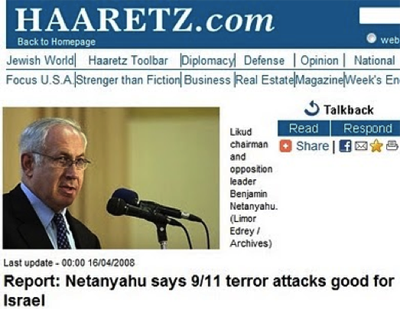
- Questionned on September 11 about the event of the day by James Bennet for the New York Times, Netanyahu let go: “It’s very good […] it will generate immediate sympathy. […], strengthen the bond between our two peoples”. He confirmed it 8 years later, at Bar-Ilan University: “We are benefiting from one thing, and that is the attack on the Twin Towers and Pentagon, and the American struggle in Iraq”, adding that these events “swung American public opinion in our favor”. (Ma’ariv, April 17, 2008).
One of the goals is to encourage Americans to view the oppression of the Palestinians as part of the fight against Islamic terrorism. As Robert Jensen said in the documentary Peace, Propaganda and the Promised Land by Sut Jhally et Bathsheba Ratzkoff (2004): “Since the Sept 11th attack on the US, Israel’s PR strategy has been to frame all Palestinian action, violent or not, as terrorism. To the extent that they can do that, they’ve repackaged an illegal military occupation as part of America’s war on terror”. On December 4th, 2004, Prime Minister Ariel Sharon justified his brutality against the people of Gaza by claiming that Al-Qaeda had established a base there; but then on December 6th, the head of Palestinian Security Rashid Abu Shbak revealed in a press conference telephone banking traces proving that the secret services of Israel had themselves tried to create fake Al-Qaeda cells in the Gaza Strip, hoping to recruit Palestinians under the name of bin Laden. The recruits had received money and (defective) weapons and, after five months of indoctrination, were instructed to claim a future attack in Israel on behalf of “the Al-Qaeda group of Gaza”. Israeli services had intended, it seems, to mount an attack (whether real or false) against their own people and do so under the name of Al-Qaeda, in order to justify retaliation against Palestine.
- In April 2003, a report titled Israeli Communications Priorities 2003, commissioned to the communications agency Luntz Research Companies & The Israel Project, by the Wexler Foundation, a Zionist organization specializing in cultural exchanges, offers linguistic recommendations to “to integrate and leverage history and communications for the benefit of Israel” with the American public. The document recommends, for example, to speak frequently of “Saddam Hussein” which are “the two words that tie Israel to America”, and “two of the most hated words in the English language right now”. “For a year — a SOLID YEAR — you should be invoking the name of Saddam Hussein and how Israel was always behind American effort to rid the world of this ruthless dictator and liberate their people”. The report also repeatedly suggests that a parallel between Saddam Hussein and Yasser Arafat need be established. By an ultimate sophistication, Michael Ledeen disputes in his book The War Against the Terror Masters (2003) the common idea that peace in Palestine is the condition for peace in the Middle East; the opposite, he claims, is true: “If we destroy the terror masters in Baghdad, Damascus, Tehran, and Riyadh, we might have a chance of brokering a durable peace [in Palestine]”.
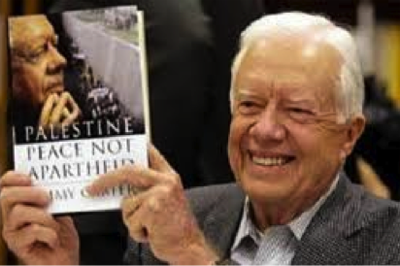
- Doublespeak is a characteristic of Israel leadership, according to former President Carter’s bitter experience, as he recalls in Palestine: Peace not Apartheid (2006): “The overriding problem is that, for more than a quarter century, the actions of some Israeli leaders have been in direct conflict with the official policies of the United States, the international community, and their own negotiated agreements”.
The road to World War IV
[dropcap]I[/dropcap]raq was first on the list. Since the first Gulf war, neocons had been demonizing Saddam Hussein’s regime. David Wurmser, for example, published in 1999, after other islamophobic books, Tyranny’s Ally: America’s Failure to Defeat Saddam Hussein. In 2000, the American Enterprise Institute published Study of Revenge: Saddam Hussein’s Unfinished War Against America, whose author, Laurie Mylroie, expresses her debt to Scooter Libby, David Wurmser, John Bolton, Michael Ledeen, and above all Paul Wolfowitz and his wife Clare Wolfowitz, also member of AEI. Mylroie goes as far as accusing Saddam Hussein of being the mastermind of anti-American terrorism, blaming him (without proofs) for the 1993 bombing of the WTC, for the 1995 Oklahoma City bombing, and for the attack against the USS Cole in Yemen in 2000. What threatens the United States, according to her, is “an undercover war of terrorism, waged by Saddam Hussein“, itself “a phase in a conflict that began in August 1990, when Iraq invaded Kuwait, and that has not ended”. Richard Perle described this book as “splendid and wholly convincing”.
Neoconservatives lost no time in exploiting against Iraq the trauma of 9/11 after creating it. As soon as September 19th , Richard Perle invited to join in a Defense Policy Board meeting neocons Paul Wolfowitz and Bernard Lewis (inventor before Huntington of the self-fulfilling prophecy of the “Clash of Civilizations”), but neither Colin Powell nor Condoleezza Rice. The assembly agreed to overthrow Saddam Hussein as soon as the initial phase of the Afghanistan war is over. In a letter to President Bush written under the letterhead of PNAC, they reminded President Bush of his historical mission: “even if evidence does not link Iraq directly to the attack, any strategy aiming at the eradication of terrorism and its sponsors must include a determined effort to remove Saddam Hussein from power in Iraq. Failure to undertake such an effort will constitute an early and perhaps decisive surrender in the war on international terrorism”. The argument of a linked between Saddam and Al-Qaïda is here toned down and, in the summer 2002, Bush and British Prime Minister Tony Blair will simply evoke “broad linkages”. Perle, however, kept claiming, against all evidence, that supposed 9/11 terrorist Mohamed Atta had met with Iraqi diplomat Ahmed Khalil Ibrahim Samir in Prague in 1999. On Seeptember 8th, 2002 in Milan, Perle even made up a scoop for the Intalian newspaper Il Sole : “Mohammed Atta met Saddam Hussein in Baghdad prior to September 11. We have proof of that”.
Rumors of a link between Saddam and Al Qaeda was finally traded for a more elaborate casus belli: Saddam’s Weapons of Mass Destruction. To force this new lie onto the American State Department and public opinion, Cheney et Rumsfeld renewed their winning strategy of Team B, consisting in overaking the CIA through a parallel team of pseudo-experts, to produice the terrifying report they needed: this will be the Office of Special Plans (OSP), established within the Near Est and South Asia (NESA) of the Pentagon, under the control of neocons William Luti, Abram Shulsky, Douglas Feith, and Paul Wolfowitz. Lieutenant Colonel Karen Kwiatkowski, who worked for NESA at that time, testified in 2004 of the incompetence of OSP members, whom she saw “usurp measured and carefully considered assessments, and through suppression and distortion of intelligence analysis promulgate what were in fact falsehoods to both Congress and the executive office of the président. [...] This was creatively produced propaganda”.
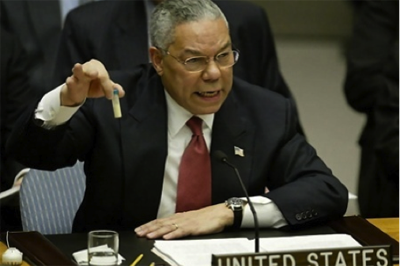
- On February 5th, 2003, Secretary of State Colin Powell engages his reputation in convincing the General Assembly of the United Nations that Saddam Hussein’s WMD poses a threat to the world. He will later regret his speech, calling it “a blot on my record”, and claiming to have been deceived himself.
Just as some neoconservatives see the failure of U.S. forces in Iraq as a pretext to threaten Iran, others find the failure to recover Saddam’s “weapons of mass destruction” a pretext to accuse Syria. In 2003, they passed on the ridiculous allegations of Ariel Sharon, who said that Iraq had secretly transferred their WMDs to Syria, along with their nuclear scientists. On November 11th, 2003, Congress passed the Syria Accountability and Lebanese Sovereignty Restoration Act, imposing economic sanctions intended “to halt Syrian support for terrorism, end its occupation of Lebanon, [and] stop its development of weapons of mass destruction”. The aggression against Syria didn’t begin until 2012, under the guise of a civil war, but it had been premeditated since at least February 2000, when David Wurmser, in an article for the American Enterprise Institute entitled “Let’s Defeat Syria, Not Appease It” was calling for a conflict through which “Syria will slowly bleed to death”.
Since September 2001, Iran has also been placed in the crosshairs of the neoconservatives. They seem to echo the sentiments of Israeli Prime Minister Ariel Sharon, who, in the London Times on November 2nd, 2002 called Iran the “center of world terror” and called for threats against Iran “the day after the U.S. invades Iraq”. The failure of U.S. troops to silence the resistance in Iraq forced the postponement of the attack on Iran. But Daniel Pipes took the bad news in good spirits, cheerfully stating in the New York Sun (February 28th, 2006) that the Iraqi civil war will invite “Syrian and Iranian participation, hastening the possibility of an American confrontation with those two states”. In spring 2008, President Bush publicly took up this new neoconservative chorus: “The regime of Teheran has a choice to make. […] If Iran makes the wrong choice, America will act to protect our interests and our troops and our Iraqi partners”. We should remember that in May 2003, through the Swiss ambassador in Tehran, the Iranian government sent to Washington a proposal known as the “Grand Bargain”, which, in exchange for the lifting of economic sanctions against Iran, promised cooperation with the United States to stabilize Iraq and to establish there a secular democracy, and was prepared to further concessions, including peace with Israel. Bush and Cheney, however, prevented Powell from responding positively to the gesture. And therefore, summarized his Chief of Staff Lawrence Wilkerson: “the secret cabal got what it wanted: no negotiations with Tehran”.
In parallel to this kind of diplomatic obstinacy, false pretenses of war have been regularly created. We know from Gwenyth Todd, advisor on the Middle East linked to the U.S. Navy Fifth Fleet stationed in the Persian Gulf, that after being barely appointed commander of the fleet in 2007, Vice Admiral Kevin Cosgriff ordered his aircraft carriers and other ships into aggressive maneuvers in order to strike panic into the Iranians, hoping for a shot fired that would allow them to engage in war for which the pro-Israel lobby was eagerly waiting. Cosgriff wanted to “put a virtual armada, unannounced, on Iran’s doorstep”, without even informing Washington, according to the Washington Post, August 21st, 2012. On January 6th, 2008, the Pentagon announced that Iranian boats fired on American ships USS Hooper and USS Port Royal on patrol in the Strait of Hormuz, while broadcasting threatening messages such as: “I am coming to you”, and “you will explode after two minutes”. The television showed one of the Iranian boats dumping small white objects into the water, presenting the situation as one of hostility, as though the white objects were mines. Referring to this exceptionally “provocative and dramatic” incident, the Chairman of the Joint Chiefs of Staff Mike Mullen expressed concern about “the threat posed by Iran”, including “the threat of mining those straits”, and affirmed his willingness to use “deadly force” if necessary. In reality, the situation presented by the media and Mullen was completely untrue. The Iranian boats that patrolled the area and often passed American ships on a daily basis, had issued no threat whatsoever. Vice Admiral Cosgriff admitted that American crews had, in fact, noted that there was nothing to worry about, since the Iranian boats carried “neither anti-ship missiles nor torpedoes”. Nor did the threatening radio messages come from these vessels: “We don’t know for sure where they came from”, admitted the spokesman for the Fifth Fleet Lydia Robertson.

- Gwenyth Todd, who opposed and denounced the provocative strategy of newly appointed commander of the U.S. Navy Fifth Fleet, fled the United States out of fear for her life and now lives in Autralia.
The 2009 Iranian elections and the ensuing protests in Tehran presented an occasion for a new tactic of psychological warfare, this time using Internet-based social networks and relayed by the American media. Within a few days, the death of a young woman that took place during the protests was appropriated as a horrifying symbol of the kind of oppression taking place in the Islamic regime. Neda Agha-Soltan was killed June 20th, 2009 by a sniper from the paramilitary, while exiting her car with her music teacher. A video of her agony and death, filmed live by mobile phone, was transmitted instantly around the world on Facebook and YouTube. Several rallies were held around the world in her honor. There was talk of her being awarded the Nobel Peace Prize. Her fiancé, a photographer named Caspian Makan, meets Shimon Peres in Israel and says: “I come to Israel as an ambassador of the Iranian people, a messenger of peace”, adding, “I have no doubt that the spirit and soul of Neda was with us during the presidential meeting”. Unfortunately, there emerge blatant inconsistencies: 1. There are actually three videos of Neda’s agaonizing death, which resemble several “takes” of the same scene. 2. A BBC interview with the doctor who attended her death is full of contradictions. 3. The autopsy concluded that Neda was killed at point blank range. 4. Finally, the face that became a global icon is actually that of another young girl, Neda Soltani. Many surmised that Neda Agha-Soltan, a apprentice actress, agreed to act her own death in exchange for a promising career abroad, but was shot for real immediately after.

- The stolen face of Neda Soltani, who tried in vain to suppress her picture from the web. Fearing for her life, she emigrated to Germany, where she published her story in My Stolen Face.
Finally, Iran is indicted, since the beginning of the first Bush presidency, for its civilian nuclear research program, claims being made that it is only a front for secret military operations. The 2005 publication of a first National Intelligence Estimate (NIE) report was the subject of intense media attention regarding Iran and its supposed interests; though its revision in 2007 should have calmed what were alarming implications from the 2005 version, it was largely ignored, as was the fact that religious leaders of Iran, begun by Ayatollah Khomeini, had issued several fatwa banning nuclear weapons and other weapons of mass destruction. Meanwhile, nothing is mentioned regarding the illegal Israeli program that operates still unacknowledged, one that has allowed Israel to stockpile an estimated 200 atomic bombs to date.

- On the 1st of February 2007, in front of the Senate Foreign Relations Committee, Brzezinski denounced the Iraq war as la guerre d’Irak comme “a historic, strategic, and moral calamity […] driven by Manichean impulses and imperial hubris”. As a veteran of deep politics, he can see what is coming next: “some provocation in Iraq or a terrorist act in the U.S. blamed on Iran; culminating in a "defensive" U.S. military action against Iran that plunges a lonely America into a spreading and deepening quagmire eventually ranging across Iraq, Iran, Afghanistan, and Pakistan”.
- [dropcap]I[/dropcap]ran counts the largest Jewish population in the Middle East after Israel. Despite generous offers from Israel, most of these 30,000 Iranian Jews refused to emigrate and remain loyal to their country. This does not fit with the repeated accusation of the Iranian government as consumed by anti-Semitism, and “preparing another Holocaust of the Jewish state”, as written in Israeli newspaper Ha’aretz (November 14, 2006).
Among the countries targeted by the neocons after 9/11, we must not forget to mention the two best allies of the U.S. in the Middle East, which is proof that the neocons do not have U.S. interests at heart. The plan to accuse and threaten Saudi Arabia was clearly built in the 9/11 false flag scenario, as is evidenced by the fact that Osama bin Laden and 15 out his 19 highjakers were Saudis. David Wurmser first opened fire in the Weekly Standard with an article titled “The Saudi Connection”, pretending that the Saudi royal family was behind the attack. The Hudson Institute had long been preparing the ground by violently denouncing all the sins (reals and imaginary) of the Saudi dynasty, under the lead of its co-founder Max Singer (today director of research at the Institute for Zionist Strategies in Jerusalem). In June 2002, the Institut sponsored a seminar called “Discourses on Democracy: Saudi Arabia, Friend or Foe?”, where all answered pointed to foe as the right answer. A special event honored the publication of the book Hatred’s Kingdom: How Saudi Arabia Supports the New Global Terrorism, by the Israeli Dore Gold, once an advisor to Netanyahu and Sharon and an ambassador to the United Nations. On July 10th, 2002, neocon Laurent Murawiec, of the Hudson Institute and Committee on the Present Danger, was invited to speak before Richard Perle’s Defense Policy Board to explain that Saudi Arabia represented “the kernel of evil, the prime mover, the most dangerous opponent”, and to recommend that the U.S. army invade it, occupy it and dismember it. He summarized his “Grand Strategy for the Middle East” by these words: “Iraq is the tactical pivot. Saudi Arabia the strategic pivot. Egypt the prize”.
The neocons are, in fact, the original inspirators of the soft challenge to the 9/11 official story, which admits the responsibility of Al Qaeda but points to links between the Bushes, the Saudies, and the bin Ladens. In their 2003 book, An End to Evil: How to Win the War on Terror, Richard Perle and and David Frum (Bush’s speech-writer) write that “The Saudis qualify for their own membership in the axis of evil”, and ask President Bush to”tell the truth about Saudi Arabia”, meaning that Saudi princes finance Al Qaeda. To understand the absurdity of such a claim, let us recall that Osama, who called the Saudi princes traitor to Islam for tolerating U.S. military bases since the Gulf war, was stripped of his Saudi nationality in 1994 and banned from the bin Laden clan. In a Declaration of War Against the Americans Occupying the Land of the Two Holy Places, published in 1996, bin Laden called for the overthrow of the Saudi dynasty and, in 1998, he admitted his role in the 1995 bombing of the National Guard headquarter in Riyad. Osama is the sworn enemy of the Saudis. It is unthinkable that the Saudis would have conspired with Osama bin Laden. On the contrary, it is plausible that the Saudis would have conspired with the Bushes against Osama bin Laden, to blame him for a terror attack in order to hunt him in Afghanistan — and, in the process, destroy the Taliban regime who had become an obstacle to the UNOCAL pipeline project: a win-win project fot the Bushes and their Saudi friends. However, the Bushes (no friends to Israel) have been outsmarted by the neocons, whose goals have little to do with oil and nothing to do with stability in Saudi Arabia. Here is probably the real purpose of having George W. Bush elected President, and the true meaning of neocon Michael Ledeen’s famous remark: “He became president, but he didn’t know why, and on sept 11, he discovered why”.
Bin Laden is a multi-use patsy. Blaming him for 9/11 made it possible to threaten and blackmail Saudi Arabia, but also Pakistan, another U.S. ally. For if the Talibans are behind bin Laden, Pakistan is behind the Talibans. No official accusation was made against Pakistan, but General Ahmed Mahmud, director of ISI (Pakistan’s CIA) was implicated by an information leaked from India (an ally to Israel, against their common enemy Pakistan), by the The Times of India on October 9th, 2001: “US authorities sought his removal after confirming the fact that $100,000 were wired to WTC hijacker Mohamed Atta from Pakistan by [ISI agent] Ahmed Omar Saïd Sheikh at the instance of General Mahmud”. Since Mohamed Atta is nothing but a patsy in this whole affair, the information can only be interpreted as a way to blackmail the ISI and Pakistan into supporting the official 9/11 story and collaborating with the U.S. to destroy the Talibans. If the ISI did pay Atta for some reason, then Atta’s name was picked as ringleader of the terrorists precisely for that reason, as a lever against Pakistan. Mahmud, who had travelled often to Washington since 1999, was there precisely between September 4 and 11, 2001. He allegedly met George Tenet, Director of the CIA, Marc Grossman, Under-Secretary of State for Political Affairs, and perhaps Condoleezza Rice (who denies). At the moment of the attacks, he was at a breakfast meeting including Bob Graham, Chairman of the Senate Intelligence Committee, and Porter Goss, Chairman of the House Intelligence Committee; “We were talking about terrorism, specifically terrorism generated from Afghanistan”, said Graham, who with Goss will be appointed to the 9/11 Commission.

- General Ahmed Mahmud. We don’t know what ultimatum he was given on September 11, but he resigned the next month and disappeared from public life to join the religious movement Tablighi Jamaat.
The fake assassination of bin Laden (or assassination of fake bin Laden) in May 2011 in Pakistan is another proof that the 9/11 master plotters intended to keep maximum pressure on Pakistan. It allowed to accuse Pakistan, after Afghanistan, of having welcomed and protected bin Laden for 10 years, which constitutes in the eyes of Americans real treason and a cause for war. Several books are written in this vein, such as Deadly Embrace: Pakistan, America, and the Future of Global Jihad by ex-CIA Bruce Riedel. According to Riedel, bin Laden’s quiet life in a suburb of Abbohabad suggest “an astonishing degree of duplicity” on the part of Pakistan, who might well be “the secret patron of global jihad on a scale almost too dangerous to conceive. We would need to rethink our entire relationship with Pakistan and our understanding of its strategic motives”.
All these wars and threats of wars under false pretexts in the wake of 9/11 betray a desire to inflame conflicts in the Middle East rather than to control resources, let alone encourage stability. Michael Ledeen himself declares in his article “The War on Terror will not end in Baghdad” in the Wall Street Journal, on September 4th, 2002: “We do not want stability in Iran, Iraq, Syria, Lebanon, and even Saudi Arabia: we want things to change. The real issue is not whether, but how to destabilize”.
What could be the motivation for these incessant accusations and two-faced policies? It’s not simply a mindless killing spree, and is rather a project designed by a group of exceptionally intelligent men, under a particular rationality with precise and realistic goals — but to what purpose? Osama bin Laden replied to this question in an article published by the London Arabic newspaper Al-Quds al-Arabi on February 23rd, 1998 (partially translated by Bernard Lewis in Foreign Affairs, November-December 1998). Referring to “the Crusader-Jewish alliance”, bin Laden speaks of “their attempts to dismember all the states of the region, such as Iraq and Saudi Arabia and Egypt and Sudan, into petty states, whose division and weakness would ensure the survival of Israel”. Indeed, it appears that a Zionist cabal is interested in a new kind of world war, one that would weaken and fragment all the enemies of Israel for decades to come, putting it in a position to surpass even the United States, who would be ruined by their ruthless military spending (just like the USSR in the 80s) and hated across the globe. Little, it would seem, stands in the way of the final phase of the Zionist plan: a thorough ethnic cleansing and the annexation of the whole of Palestine. Not without some irony, the neoconservative Stephen Schwartz, author of The Two Faces of Islam: The House of Saud, from Tradition to Terror (2003), attributed to Saudi Arabia a plan that would spread terror throughout the world (while recognizing Saudi Arabia “incapable of defending its own territory”) and blamed Islam for the emergence of a World War whose bloody unfolding will mean: “The war against terrorist Wahhabism is therefore a war to the death, as the second world war was a war to the death against fascism”.
In an article in the Wall Street Journal dated November 20th, 2001, the neoconservative Eliot Cohen speaks about the war against terrorism as “World War IV”, a framing soon echoed by other neoconservatives. In September 2004, at a conference in Washington attended by neoconservatives Norman Podhoretz and Paul Wolfowitz entitled “World War IV: Why We Fight, Whom We Fight, How We Fight”, Cohen said: “The enemy in this war is not ‘terrorism’ […] but militant Islam”. Like the Cold War (considered to be a third world war), this Fourth World War, as seen prophetically by Cohen, has ideological roots, will have global implications and will last a long time, involving a whole range of conflicts. The rhetorical device of this “fourth” global conflict has also been popularized by Norman Podhoretz, in “How to Win World War IV” published in Commentary in February 2002, followed by a second article in September 2004, “World War IV: How It Started , What It Means, and Why We Have to Win”, and finally in 2007 in a book called “World War IV: The Long Struggle Against Islamofascism”.
The Bible and the Empire
[dropcap]C[/dropcap]learly, the strategists of Likud and their neoconservative allies intend to forge their legacy as those who waged and won the global annihilation of the Islamic civilization. How does one account for such hubris? One explanation lies in the very nature of the State of Israel and the leadership role held by its military since day one, not unlike the American National Security State. David Ben Gurion, who combined the functions of Prime Minister and Defense Minister, saw the whole fate of Israel integrally intertwined with its failure or success in the defeat of an Arab enemy: “Why should the Arabs make peace? If I were an Arab leader I would never make terms with Israel. That is natural: […] we have come here and stolen their country. Why should they accept that? They may perhaps forget in one or two generations’ time, but for the moment there is no chance. So, it’s simple: we have to stay strong and maintain a powerful army. Our whole policy is there. Otherwise the Arabs will wipe us out” (Nahum Goldmann, The Jewish Paradox: A Personal Memoir, 1978). Thus, circumstances decree that Israel is and will be a security state.
It is, of course, also a colonizing state. Even when Levi Eshkol replaced Ben Gurion in 1963 as Prime Minister, his government could not oppose the military’s will of annexing new territories, as revealed Ariel Sharon to journalist Ze’ev Schiff shortly after the Six Days War: “We could have locked the ministers in the room and gone off with the key. We would have taken the appropriate decisions and no one would have known that the events taking place were the result of decisions by major generals” (Ha’aretz, June 1st, 2007).
Sharon is the man who, in the eyes of Israel and the world, most aptly embodied the spirit of the Israeli military and its security apparatus. He commanded Unit 101, which, on October 14th, 1953 razed the village of Qibya, Jordan, with dynamite, killing 69 civilians in their homes. In 1956, during the Suez Canal crisis, a unit under his command executed more than 200 Egyptian prisoners and Sudanese civilians. In 1971, charged with putting an end to ongoing resistance in the Gaza Strip, his troops killed more than 100 Palestinian civilians. And in September 1982, acting as the Minister of Defense, he launched the invasion of Lebanon, where, after his slaughter of refugees in two Palestinian camps in West Beirut he was given the nickname, “the butcher of Sabra and Chatila”. The Prime Minister at that time was Menachem Begin, once the leader of the Irgun terrorist militia, who coordinated both the attack on the King David Hotel in 1946, and the Deir Yassin massacre in 1948.
Begin, Sharon and Netanyahu’s Likud has never stopped campaigning for a Greater Israel and against a proposed Palestinian state. While Foreign Minister to Netanyahu from 1996 to 1999, Sharon described the Oslo Accords as “national suicide” and rather advocated the “biblical borders”, thereby encouraging illegal settlements: “Everybody has to move, run and grab as many hilltops as they can to enlarge the settlements because everything we take now will stay ours” he said on November 15th, 1998. When he came to power in February 2001, with Netanyahu in turn becoming Foreign Minister, Sharon deliberately sabotaged the peace process and set off the second intifada through a series of calculated provocations. When on March 28th, 2001, 22 nations gathered in Beirut under the auspices of the Arab League and agreed to recognize Israel if it only complied with Resolution 242, the next day, the Israeli army invaded and besieged Yasser Arafat in his headquarters in Ramallah. Six months later, September 11th brought the fatal blow to any hope of peace.
The Likud and its political allies among religious extremists are not merely opposed to the secession of Palestine; they are driven by an almost imperial vision of Israel’s destiny. In December 1981, Ariel Sharon expressed in a speech for the Institute for Strategic Affairs at Tel Aviv University: “Beyond the Arab countries in the Middle East and on the shores of the Mediterranean and the Red Sea, we must expand the field of Israel’s strategic and security concerns in the eighties to include countries like Turkey Iran, Pakistan, and areas like the Persian Gulf and Africa, and in particular the countries of North and Central Africa” (as translated from Hebrew in the Journal of Palestine Studies). This speech will be canceled at the last minute because of the controversy over the annexation of the Syrian territories at Golan Heights, but it will be published shortly after the in daily Ma’ariv. This “Sharon doctrine” is found in a number of Hebrew texts, translated and published by the dissident Israel Shahak in Open Secrets: Israeli Nuclear and Foreign Policies (1997). In an essay entitled “A Strategy for Israel in the Eighties” written for the World Zionist Organization in February 1982, Oded Yinon, a former senior official in the Ministry of Foreign Affairs, put forward a strategy to exert control over the Middle East through the fragmentation of Israel’s neighbors, beginning with Lebanon: “The total disintegration of Lebanon into five regional localized governments is the precedent for the entire Arab world including Egypt, Syria, Iraq, and the Arab peninsula, in a similar fashion. The dissolution of Egypt and later Iraq into districts of ethnic and religious minorities following the example of Lebanon is the main long-range objective of Israel on the Eastern Front. The present military weakening of these states is the short-term objective. Syria will disintegrate into several states along the lines of its ethnic and sectarian structure, as is happening in Lebanon today.”
The ideology behind Likud’s strategy and its neoconservative allies is an intransigent version of Zionism. Zionism, as its name suggests (Zion is the name given to Jerusalem 152 times in the Hebrew Bible), is before anything else a biblical dream, shaped by the biblically defined borders of Eretz Israel. “The Bible is our mandate”, proclaimed Chaim Weisman, the future first President of Israel, at the Versailles Conference in 1919. In Germany in the late 19th century, the biblical notion of a “chosen people” was translated by the founding fathers of Zionism into a racial ideology, correlative and in competition with the fantastical dream of a superior pan-Germanic Aryan race. Zionism, like Nazism, opposed the assimilationist trend of the majority of German Jews. Zeev Jabotinsky wrote in 1923, two years before Hitler’s Mein Kampf: “A Jew raised in the midst of Germans can certainly adopt German customs and speak the German language. He can become totally immersed in this German milieu, but he will always be a Jew, because his blood, his body and his racial type, his entire organic system, is Jewish”. We now know that these kinds of claims are categorically unscientific: Israeli settlers from Eastern Europe can not claim any biological descent from among the ancient Hebrews in Judea or Samaria, unlike the Palestinians they’ve evicted from their ancestral lands, and perhaps the Sephardic Jews from North Africa, once called “human garbage” by the Prime Minister Levi Eshkol and submitted to eugenic policies in the 1950s (Haim Malka, Selection and Discrimination in the Aliya and Absorption of Moroccan and North African Jewry, 1948-1956, 1998).
The Zionism of Zev Jabotinsky is as important a key as the Machiavellianism of Leo Strauss in decrypting the mentality of the men who, in Israel and in the United States, are trying to reshape the Middle East. It is, at least, a key to understand the ultimate goals of Benjamin Netanyahu, whose father, Ben Zion Netanyahu (born Mileikowsky in Warsaw), was the personal secretary of Jabotinsky. March 31st, 2009, Netanyahu appointed Foreign Minister Avigdor Lieberman, from the Yisrael Beiteinu party that presents itself as “a national movement with the clear vision to follow in the brave path of Zev Jabotinsky”. Lieberman is intent upon, “fighting Hamas just as the United States fought the Japanese during the Second World War”.
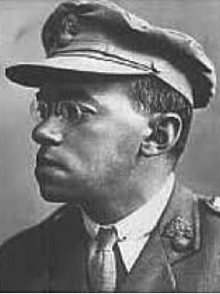
- Zev Jabotinsky writes in The Iron Wall: We and the Arabs: “All colonization, even the most restricted, must continue in defiance of the will of the native population. Therefore, it can continue and develop only under the shield of force which comprises an Iron Wall which the local population can never break through. This is our Arab policy. To formulate it any other way would be hypocrisy. […] Zionism is a colonizing adventure and therefore it stands or it falls by the question of armed force”.
Zionism has outlived Nazism because, after the war, it was able to shamelessly capitalize on the terrible persecution of Jews in Europe and usurp the representation of the Jewish community. To do that, it had to force the forgetting of its active involvement with the Nazi regime in the 30s, which then saw the immigration of Jews to Palestine the “solution to the Jewish problem” (see Lenni Brenner’s 51 Documents: Zionist Collaboration with the Nazis, 2009). The pervasive legitimacy of Zionism has also relied heavily upon its biblical roots. Despite being agnostic, David Ben Gurion (born Grün), was indoctrinated by the biblical story, to the point of adopting the name of a Judean general who fought the Romans; “There can be no worthwhile political or military education about Israel without profound knowledge of the Bible”, he is quoted stating (Dan Kurzman, Ben-Gurion, Prophet of fire, 1984). While envisioning an attack against Egypt in 1948, he wrote in his diary: “This will be our revenge for what they did to our ancestors in Biblical times” (Ilan Pappe, The Ethnic Cleansing of Palestine, 2008). The planned ethnic cleansing by Ben Gurion in 1947-48, which forced the fleeing of 750,000 Palestinians (more than half of the native population), was deeply reminiscent of that which was ordained by Yahweh against the Canaanites: “dispossess them of their towns and houses” (Deuteronomy 19:1), and, in the towns that resist, “not leave alive anything that breathes” (Deuteronomy 20:16-17).
This dream instilled by the biblical God to His chosen people is not only racist, it is also militarist and imperialist. These verses from the second chapter of Isaiah (reproduced in Micah 4:1-3) are often held up to show the pacifist trend of the biblical prophecy: "they shall beat their swords into plowshares, their spears into pruning hooks. Nation will not take up sword against nation, nor will they train for war anymore” (Isaiah 2:4); but in taken in context, we see that this Pax Judaica will come only when “all the nations shall flow” to the Jerusalem temple, from where “shall go forth the law” (Isaiah 2:1-3). This vision of a new world order with Jerusalem at its center resonates within the Likudnik and neoconservative circles. At the Jerusalem Summit, held from October 12th to 14th, 2003 in the symbolically significant King David Hotel, an alliance was forged between Zionist Jews and Evangelical Christians around a “theopolitical” project, one that would consider Israel, according to the “Jerusalem Declaration” published on the official website of the Summit, “the key to the harmony of civilizations”, replacing the United Nations that’s become a “a tribalized confederation hijacked by Third World dictatorships”: “Jerusalem’s spiritual and historical importance endows it with a special authority to become a center of world’s unity. [...] We believe that one of the objectives of Israel’s divinely-inspired rebirth is to make it the center of the new unity of the nations, which will lead to an era of peace and prosperity, foretold by the Prophets”. Three acting Israeli ministers spoke at the summit, including Benjamin Netanyahu, and Richard Perle, the guest of honor, received on this occasion the Henry Scoop Jackson Prize.
Jerusalem’s dream empire is expected to come through the nightmare of world war. The prophet Zechariah, often cited on Zionist forums, predicted that the Lord will fight “all nations” allied against Israel. In a single day, the whole earth will become a desert, with the exception of Jerusalem, who “shall remain aloft upon its site” (14:10). Zechariah seems envision what God could do with nuclear weapons: “And this shall be the plague with which the Lord will smite all the peoples that waged war against Jerusalem: their flesh shall rot while they are still on their feet, their eyes shall rot in their sockets, and their tongues shall rot in their mouths” (14:12). It is only after the carnage that will world finally find peace, providing their worship of “the Lord Almighty”: “Then every one that survives of all the nations that have come against Jerusalem shall go up year after year to worship the King, the Lord of hosts, and to keep the feast of booths. And if any of the families of the earth do not go up to Jerusalem to worship the King, the Lord of hosts, there will be no rain upon them...” (14:16-17)
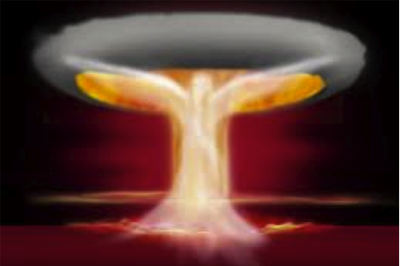
- Evangelical Christians, who welcome the End of the World as good news, find in the Book of Revelation plenty to feed their fantasy, especially with the Angel Faithful and True of chapter 19, coming with “the armies of heaven”, with eyes “like a flame of fire”, “a robe dipped in blood”, and in his mouth “ a sharp sword with which to smite the nations”.
- With more than 50 millions members, Christians United for Israel is a major politica force in the U.S.. Its Chairman, pastor John Haggee, declared: “The United States must join Israel in a pre-emptive military strike against Iran to fulfill God’s plan for both Israel and the West, [...] a biblically prophesied end-time confrontation with Iran, which will lead to the Rapture, Tribulation, and Second Coming of Christ”.
Is it possible that this biblical dream, mixed with the neo-Machiavellianism of Leo Strauss and the militarism of Likud, is what is quietly animating an exceptionally determined and organized ultra-Zionist clan? General Wesley Clark testified on numerous occasions before the cameras, that one month after September 11th, 2001 a general from the Pentagon showed him a memo from neoconservative strategists “that describes how we’re gonna take out seven countries in five years, starting with Iraq, and then Syria, Lebanon, Libya, Somalia and Sudan and finishing off with Iran”. Is it just a coincidence that the “seven nations” doomed to be destroyed by Israel form part of the biblical myths instilled in Israeli schoolchildren? According to Deuteronomy, when Yahweh will deliver Israel “seven nations greater and mightier than yourself […] you must utterly destroy them; you shall make no covenant with them, and show no mercy to them. You shall not make marriages with them…” (7:1-2). “And he will give their kings into your hand, and you shall make their name perish from under heaven” (7:24).
THIS HAS BEEN A POST IN THE
 Laurent Guyénot is an engineer (National School of Advanced Technology, 1982) and medievalist (PhD in Medieval Studies at Paris IV-Sorbonne, 2009). He has authored numerous books on the subject. He has dedicated the past three years to studying the behind-the-scenes history of the United States, where he lived for five years.
Laurent Guyénot is an engineer (National School of Advanced Technology, 1982) and medievalist (PhD in Medieval Studies at Paris IV-Sorbonne, 2009). He has authored numerous books on the subject. He has dedicated the past three years to studying the behind-the-scenes history of the United States, where he lived for five years. 
This work is licensed under a Creative Commons Attribution-NonCommercial 4.0 International License
![]()
[premium_newsticker id=”154171″]
Things to ponder
While our media prostitutes, many Hollywood celebs, and politicians and opinion shapers make so much noise about the still to be demonstrated damage done by the Russkies to our nonexistent democracy, this is what the sanctimonious US government has done overseas just since the close of World War 2. And this is what we know about. Many other misdeeds are yet to be revealed or documented.
Parting shot—a word from the editors
The Best Definition of Donald Trump We Have Found
 In his zeal to prove to his antagonists in the War Party that he is as bloodthirsty as their champion, Hillary Clinton, and more manly than Barack Obama, Trump seems to have gone “play-crazy” — acting like an unpredictable maniac in order to terrorize the Russians into forcing some kind of dramatic concessions from their Syrian allies, or risk Armageddon.However, the “play-crazy” gambit can only work when the leader is, in real life, a disciplined and intelligent actor, who knows precisely what actual boundaries must not be crossed. That ain’t Donald Trump — a pitifully shallow and ill-disciplined man, emotionally handicapped by obscene privilege and cognitively crippled by white American chauvinism. By pushing Trump into a corner and demanding that he display his most bellicose self, or be ceaselessly mocked as a “puppet” and minion of Russia, a lesser power, the War Party and its media and clandestine services have created a perfect storm of mayhem that may consume us all.— Glen Ford, Editor in Chief, Black Agenda Report
In his zeal to prove to his antagonists in the War Party that he is as bloodthirsty as their champion, Hillary Clinton, and more manly than Barack Obama, Trump seems to have gone “play-crazy” — acting like an unpredictable maniac in order to terrorize the Russians into forcing some kind of dramatic concessions from their Syrian allies, or risk Armageddon.However, the “play-crazy” gambit can only work when the leader is, in real life, a disciplined and intelligent actor, who knows precisely what actual boundaries must not be crossed. That ain’t Donald Trump — a pitifully shallow and ill-disciplined man, emotionally handicapped by obscene privilege and cognitively crippled by white American chauvinism. By pushing Trump into a corner and demanding that he display his most bellicose self, or be ceaselessly mocked as a “puppet” and minion of Russia, a lesser power, the War Party and its media and clandestine services have created a perfect storm of mayhem that may consume us all.— Glen Ford, Editor in Chief, Black Agenda Report
window.newShareCountsAuto="smart";

